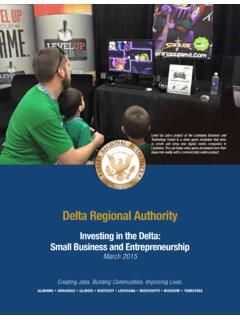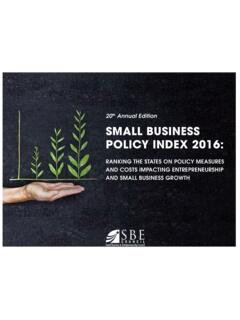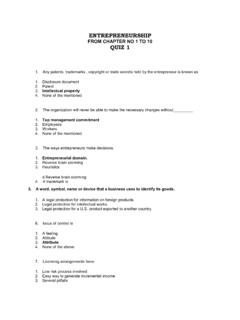Transcription of ENTREPRENEURSHIP AND BUSINESS ECONOMICS
1 Curriculum Standards and Indicators 66 ENTREPRENEURSHIP AND BUSINESS ECONOMICS economic Concepts A. Understand the economic principles and concepts fundamental to ENTREPRENEURSHIP / small - BUSINESS ownership 1. Discuss basic concepts of ENTREPRENEURSHIP / small BUSINESS ownership A101 Distinguish between economic goods and services A102 Explain the concept of economic resources A103 Describe the nature of ECONOMICS and economic activities A104 Determine forms of economic utility created by BUSINESS activities A105 Explain the principles of supply and demand A106 Describe the concept of price A107 Explain the types of economic systems A108 Determine the relationship between government and BUSINESS A109 Explain the concept of private enterprise A110 Identify factors affecting a BUSINESS s profit A111 Determine factors affecting BUSINESS risk
2 A112 Explain the concept of competition A113 Identify the impact of small BUSINESS / ENTREPRENEURSHIP on market economies 2. Examine cost-profit relationships A201 Explain the concept of productivity A202 Analyze the impact of specialization/division of labor on productivity A203 Explain the concept of organized labor and BUSINESS A204 Explain the law of diminishing returns 3. Discuss economic indicators/trends A301 Explain measures used to analyze economic conditions A302 Explain the nature of the Consumer Price Index A303 Explain the concept of Gross Domestic Product A304 Determine the impact of BUSINESS cycles on BUSINESS activities 4.
3 Recognize international BUSINESS concepts A401 Explain the nature of international trade Curriculum Standards and Indicators 67A402 Describe small - BUSINESS opportunities in international trade A403 Identify the impact of cultural and social environments on world trade A404 Evaluate influences on a nation's ability to trade BUSINESS Concepts B. Understand fundamental BUSINESS concepts that affect BUSINESS decision making 1. Discuss fundamental BUSINESS concepts B101 Explain the role of BUSINESS in society B102 Describe types of BUSINESS activities B103 Identify types of businesses B104 Explain opportunities for creating added value B105 Identify issues and trends in BUSINESS B106 Describe crucial elements of a quality culture/continuous quality improvement B107 Describe the role of management in the achievement of quality 2.
4 Discuss core BUSINESS activities B201 Explain marketing management and its importance in a global economy B202 Describe marketing functions and related activities B203 Explain the nature and scope of operations management B204 Explain the concept of management B205 Explain the concept of financial management B206 Explain the concept of human resource management B207 Explain the concept of risk management B208 Explain the concept of strategic management Entrepreneurial Processes C. Understands concepts and processes associated with successful entrepreneurial performance 1. Discuss the Discovery stage of ENTREPRENEURSHIP C101 Explain the need for entrepreneurial discovery C102 Assess global trends and opportunities C103 Determine opportunities for venture creation C104 Assess opportunities for venture creation C105 Describe idea-generation methods Curriculum Standards and Indicators 68C106 Generate venture ideas 2.
5 Discuss the Concept Development stage of ENTREPRENEURSHIP C201 Describe entrepreneurial planning considerations C202 Explain tools used by entrepreneurs for venture planning C203 Assess start-up requirements C204 Assess risks associated with venture C205 Describe external resources useful to entrepreneurs during concept development C206 Use components of a BUSINESS plan to define venture idea 3. Discuss the Resourcing stage of ENTREPRENEURSHIP C301 Distinguish between debt and equity financing for venture creation C302 Describe processes used to acquire adequate financial resources for venture creation/start-up C303 Describe considerations in selecting capital resources C304 Assess the costs/benefits associated with resources 4.
6 Discuss the Actualization stage of ENTREPRENEURSHIP C401 Explain the need for BUSINESS systems and procedures C402 Explain methods/processes for organizing work flow C403 Explain the impact of resource productivity on venture success C404 Create processes for ongoing opportunity recognition C405 Adapt to changes in BUSINESS environment 5. Discuss the Harvesting stage of ENTREPRENEURSHIP C501 Explain the need for continuation planning C502 Describe methods of venture harvesting C503 Evaluate options for continued venture involvement C504 Develop exit strategies Entrepreneurial Traits/Behaviors D. Understand the personal traits/behaviors associated with successful entrepreneurial performance 1.
7 Conduct Personal Assessment D101 Describe desirable entrepreneurial personality traits D102 Determine personal biases and stereotypes D103 Evaluate personal capabilities D104 Conduct self-assessment to determine entrepreneurial potential Curriculum Standards and Indicators 69 2. Manage Personal Traits D201 Maintain positive attitude D202 Demonstrate interest and enthusiasm D203 Develop an orientation to change D204 Demonstrate problem-solving skills D205 Assume personal responsibility for decisions D206 Use time-management principles D207 Develop tolerance for ambiguity D208 Use feedback for personal growth D209 Demonstrate creativity D210 Set personal goals Adapted from National Content Standards for ENTREPRENEURSHIP Education.
8 Consortium for ENTREPRENEURSHIP Standards and Indicators 70 ENTREPRENEURSHIP and BUSINESS ECONOMICS EBE A1 Topic economic Principles Performance Indicator A. Understand the economic principles and concepts fundamental to ENTREPRENEURSHIP / small - BUSINESS ownership Standard 1. Discuss basic concepts of ENTREPRENEURSHIP / small BUSINESS ownership SCANS Information 5; Systems 15; Basic Skills 6; Thinking Skills 12 Show-Me Standards ; ; SS4 Objectives A101 A102 A103 A104 A105 A106 A107 A108 A109 A110 A111 A112 A113 Distinguish between economic goods and services Explain the concept of economic resources Describe the nature of ECONOMICS and economic activities Determine forms of economic utility created by BUSINESS activities Explain the principles of supply and demand Describe the concept of price Explain the types of economic systems Determine the relationship between government and BUSINESS Explain the concept of private enterprise Identify factors affecting a BUSINESS s profit Determine factors affecting BUSINESS risk Explain the concept of competition Identify the
9 Impact of small BUSINESS / ENTREPRENEURSHIP on market economies Sample Activities Select a product and prepare a graph showing the variations of supply and demand for that product over time. Interview a BUSINESS person and an elected official about the ways in which government supports BUSINESS and ways in which it restricts BUSINESS . Present your interview findings in a written report and as an oral presentation to the class. Research the growth of entrepreneurial businesses in command economies such as China and Vietnam. Identify three reasons for this growth, and relate those reasons to the US economic growth. Curriculum Standards and Indicators 71 ENTREPRENEURSHIP and BUSINESS ECONOMICS EBE A2 Topic economic Principles Performance Indicator A.
10 Understand the economic principles and concepts fundamental to ENTREPRENEURSHIP / small - BUSINESS ownership Standard 2. Examine cost-profit relationships SCANS Information 5; Systems 15; Basic Skills 6; Thinking Skills 12 Show-Me Standards ; ; SS4 Objectives A201 A202 A203 A204 Explain the concept of productivity Analyze the impact of specialization/division of labor on productivity Explain the concept of organized labor and BUSINESS Explain the law of diminishing returns Sample Activities Describe in writing how information technology has increased productivity in a local BUSINESS or industry of your choice. Prepare a presentation which covers the pros and cons of organized labor as a contributor to economic development.



















